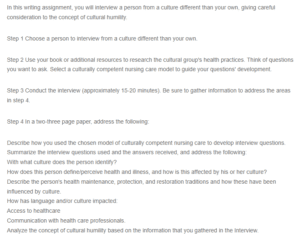We’ll write everything from scratch Question In this writing assignment, you will interview a person from a culture different than your own, giving careful consideration to the concept of cultural humility. Cultural Humility and Competence Step 1 Choose a person to interview from a culture different than your own. Step 2 Use your book or additional resources to research the cultural group’s health practices. Think of questions you want to ask. Select a culturally competent nursing care model to guide your questions’ development. Step 3 Conduct the interview (approximately 15-20 minutes). Be sure to gather information to address the areas in step 4. Step 4 In a two-three page paper, address the following: Describe how you used the chosen model of culturally competent nursing care to develop interview questions. Summarize the interview questions used and the answers received, and address the following: With what culture does the person identify? How does this person define/per
Cultural Humility and Competence
Cultural humility enables individuals to understand their culture and other people’s culture. All stakeholders should be willing to inquire, learn, and develop self-awareness to achieve cultural humility (Kaihlanen et al., 2019). This paper discusses a nursing model that created a framework for my interview. Also, it discusses the findings from my interview. Hire our assignment writing services if your assignment is devastating you.
The Nursing Model
The Leininger Sunrise Model (LSM) allowed me to formulate interview questions. The model facilitates the cultural assessment of patients. Nurses leverage this model to understand a specific population’s behaviors, preferences, customs, and values (Wehbe-Alamah & McFarland, 2020). Furthermore, the model allows nurses to determine the impact of language, religion, education, politics, technology, economic status, and social environment on the delivery of healthcare services (Wehbe-Alamah & McFarland, 2020). Gaining a better understanding of a patient or population eliminates stereotypes and discriminatory healthcare practices. The three concepts of LSM guided the formulation of my interview questions. The first concept is cultural preservation. This concept directs nurses to offer services that are harmonious with patients’ cultural practices (Wehbe-Alamah & McFarland, 2020). The second concept is cultural negotiation. This concept directs nurses and other healthcare providers to support cultural practices that promote the overall well-being of patients and their families (Wehbe-Alamah & McFarland, 2020). The third concept is cultural restructuring. This concept directs nurses to offer holistic services that seek to change or modify patients’ cultural practices (Wehbe-Alamah & McFarland, 2020). The concept is applied when cultural practices pose potential risks to patients.
Summarized Answers to Interview Questions
Firstly, I asked the interviewee about the culture he identifies with. He is a Native American. Secondly, I inquired about his perception of health and illness. According to him, health and illness are dependent on the spiritual world. Good health is achieved by maintaining a balance between the external environment and the spiritual world. Illness occurs when an imbalance is created between these aspects. For this reason, the interviewee reported that he seeks healthcare services from various professions. For instance, if he sprains his leg, he will seek healthcare from physicians and traditional herbalists. Thirdly, I inquired about the impact of the patient’s culture on his perception of health and illness. He reported that Native Americans attribute illnesses to supernatural forces. According to them, the potential causes of illnesses include ancestral sins, evil spirits, and failure to fulfill personal dreams and desires. Also, the interviewee reported that healing is a sacred process. Natural healers, like medicine men, should remain committed to helping other people regardless of their cultural backgrounds.
Regarding health maintenance and protection, the interviewee reported that he leverages conventional medicine and traditional health healing practices to maintain optimal health. In this context, the interviewee leads a healthy lifestyle, uses modern medicine, and seeks the services of traditional medicine men. The interviewee reports that the elderly members of the community enforce the restoration of their traditions. Healthcare beliefs and general practices are passed from the elderly to the young generation. This prevents the erosion of the community’s traditions by modern civilization.
The interviewee reported that culture has impacted access to health and communication with healthcare practitioners. For example, he will likely delay seeking healthcare services when he experiences pain. This is attributed to the observation that Native Americans dislike discussing their medical condition (AMA-ASSN.org, 2020). Also, they are likely to be wary of the addiction risk or adverse effects associated with medications. Also, native Americans are less likely to seek conventional medicine because they believe that they will be healed via traditional practices(AMA-ASSN.org, 2020).
Kaihlanen et al. (2019) report that cultural humility requires healthcare providers to offer services that acknowledge and respect patients’ beliefs and practices. Cultural humility fosters inclusivity and averts discrimination and stereotypes (Kaihlanen et al., 2019). In this context, healthcare providers should uphold cultural sensitivity when caring for Native Americans. They should respect their choices, such as the belief in complementary and alternative medici
